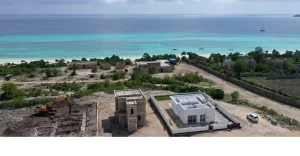Arusha. Wedding is a sleeping giant in the travel and tourism industry, with a huge potential for Tanzania to hook the lion’s share, a global travel agent has said, thanks to its finest natural beauty.
The global destination wedding market, currently valued at $36.49 billion, up from $27.64 billion in 2023, is marking an astounding growth of 32 percent.
This burgeoning industry thrives on a symphony of unique experiences, amplified by the growing affordability of travel, the pervasive influence of social media on travel trends, and a surging interest in wedding tourism.
“Tanzania promises unparalleled settings for modern wedding celebrations,” said Ms Kitzia Morales who doubles as the president of International Association of Destination Wedding Professionals (IADWP).
Once known primarily for its extraordinary wildlife and awe-inspiring landscapes, Tanzania is most likely to witness a remarkable transformation.
Beyond the legendary Serengeti National Park, Africa’s towering sentinel Mount Kilimanjaro, and the lush Ngorongoro Crater—familiarly hailed as Africa’s Eden Garden—Tanzania is better positioned to vie for its place as a premier wedding destination.
“Picture couples exchanging vows against the backdrop of rolling savannahs, atop Kilimanjaro’s majestic peak, or on the pearl-white beaches of Zanzibar; these visions are set to become realities,” Ms Morales noted.
She added: “Tanzania is the most beautiful tourism destination anyone can fathom, from its finest national parks like Serengeti and Ngorongoro, to the serene Zanzibar beaches. It’s high time tour operators incorporated weddings into their itineraries to harvest the dollars.”
“Imagine the deep greens and sweeping vistas of the luxurious wilderness hotels,” she cited, adding others such as the hypnotic allure of thunderous waterfalls, and the tranquil beauty of Zanzibar’s coastline, as some of the preferred sceneries for the modern weddings.
It is an open invitation for couples seeking exotic locales for their nuptials, Ms Morales said, adding that with tour operators ready to seize this golden opportunity, Tanzania is poised to emerge as the ultimate wedding destination, transforming its tourism landscape and beckoning lovers from across the globe to join in wedlock amidst its breathtaking splendour.
For his part, Turkey Travel Agent who serves as the vice president of Istanbul Tourism Association (ISTA), Mr Murtaza Kalender, said Tanzania has what it takes to woo 15 million tourists in the next decade, if the current efforts to engage global travel agents, are sustained.
The African Queen Adventures CEO, Ms Alice Manupa in collaboration with, Rethinking Tourism Africa backed by the ministry of Natural Resources and Tourism has successfully managed to roll out a red carpet for 120 global travel agents from 56 countries around the World for B2B meetings with the local tour operators.
Deputy Conservation Commissioner in the Research and Training section of the ministry of Natural Resources and Tourism, Mr Iman Nkuwi, presented the Tanzania tourism investment opportunities saying the country needs investors in state-of-the-art recreation facilities, wildlife captive facilities, lodge and camps, bee keeping, forestry, MICE, among others.
“We have earmarked a total of 179 investment sites for accommodation facilities with the capacity to add extra 7,744 beds,” Mr Nkuwi explained.
The International Tourism Summit Africa 2024 was not just about boardrooms and handshakes.
The ITSA has orchestrated an extraordinary familiarisation trip.
“Imagine the top agents exploring our natural national parks, encountering diverse wildlife, and falling in love with Tanzania’s soul-stirring beauty” Ms Manupa said.
Mr Sirili Akko, CEO of the Tanzania Association of Tour Operators (Tato), echoes their excitement. “The arrival of the top 120 global travel agents is monumental. It signals their confidence in our nation—a premier destination for travel and adventure” Mr Akko said.
“As the B2B interactions unfold, local tour companies stand to gain. These doors swing wide open, bridging continents and creating lasting partnerships” said Edna Foya, the director of the Rethinking Tourism Africa (RTA).















